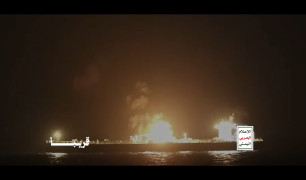وكالة أسوشيتد برس الأمريكية: وفاة 35 شخصًا بسبب البرد القارس جراء العاصفة الثلجية التي تضرب البلاد
الهلال الأحمر الفلسطيني: إصابة طفل برصاص العدو في مخيم قلنديا شمال القدس
محمد أكبر زاده: دول الجوار أصدقاء لنا لكن إذا استُخدمت أراضيها أو أجواؤها أو مياهها ضد إيران فستعد أطرافا معادية
محمد أكبر زاده: أمن الممر الاستراتيجي هرمز مرتبط بقرارات طهران
مساعد قائد القوة البحرية في حرس الثورة الإسلامية للشؤون السياسية محمد أكبر زاده: لدينا قدرات سيكشف عنها في الوقت المناسب
مصادر فلسطينية: إصابة شاب برصاص قوات العدو خلال المواجهات في مخيم قلنديا شمال القدس المحتلة
د.الدرويش: استيراد الأدوية والمستلزمات الطبية تراجع بنسبة 60% بسبب الحصار الأمريكي السعودي
رئيس اللجنة الطبية العليا د.مطهر الدرويش للمسيرة: الحصار تسبب في ازدياد الحالات المستعصية وفاقم الحالات المرضية بسبب الافتقار للأدوية المناسبة
الأصبحي: الولايات المتحدة ضغطت على المنظمات لسحب أنشطتها من اليمن
الأصبحي: من الحالات المحتاجة للعلاج في الخارج أكثر من 3 آلاف طفل مصابين بتشوهات قلبية وألف حالة بحاجة إلى زراعة قرنية






































































